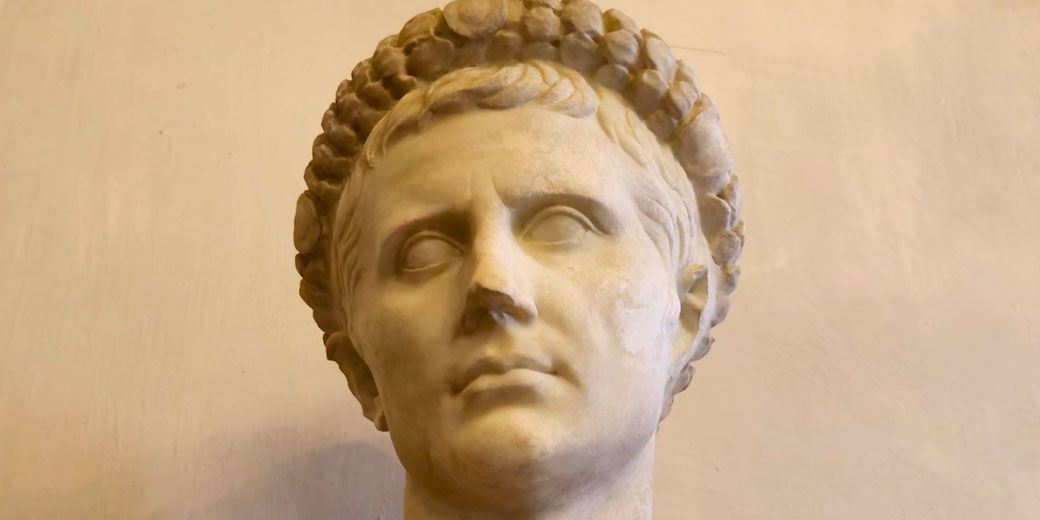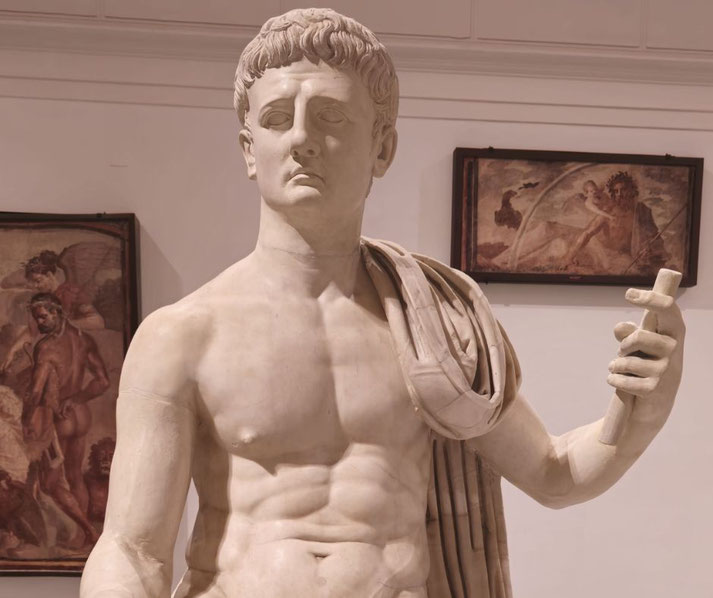How Emperor Augustus interfered with peoples’ marriages to stop Romans having sordid affairs

In the final decades of the first century BCE, Rome emerged from the violence of civil war into a period of imperial consolidation under Augustus.
As part of his wider reforms, Augustus pursued a moral program that aimed to restore traditional Roman virtues and regulated personal behaviour.
His most direct measures targeted marriage, adultery, and reproduction, areas of life which had previously remained outside the direct control of the state.
The scandalous nature of Roman society
Roman aristocrats during the late Republic became known for their indulgent lifestyles and public indecency, together with a widespread lack of moral restraint.
Long-standing ideals of virtus, discipline, and family loyalty, once praised by earlier generations, no longer held sway among many political and social elites.
In speeches and writings, figures such as Sallust, Livy, and Cicero lamented the apparent collapse of Roman moral standards, often blaming luxury and foreign influence, coupled with repeated civil conflict for the decline.
Throughout the final century of the Republic, men of influence routinely engaged in extramarital affairs, maintained mistresses or slave concubines, and circulated among brothels without suffering damage to their reputations.
Marriage, which had once formed the centre of Roman civic life, lost importance among the wealthy, who increasingly treated it as a tool for inheritance or alliance rather than a source of loyalty and reproduction.
Prominent women likewise became entangled in public scandal, and figures like Clodia and Fulvia drew criticism for disregarding the traditional expectations of Roman matrons.
Within this atmosphere of 'sexual freedom', marriage rates declined, and the number of children born to the upper orders fell below replacement levels.
Some estimates suggest that birth rates among the senatorial class had declined so sharply that a sustainable population could no longer be maintained without legal intervention.
Many senators and equestrians chose to remain unmarried, and those who did marry often avoided fathering legitimate offspring.
These choices preserved their wealth, limited entanglements in political alliances, and allowed them to retain greater control over their estates.
However, Augustus believed that this behaviour, if left unchecked, would weaken the military strength, civic stability, and moral strength of the Roman state.

The Leges Juliae (Julian Laws)
In response to these concerns, Augustus introduced a set of laws in 18 BCE that directly intervened in the domestic lives of Roman citizens.
The Lex Julia de maritandis ordinibus required citizens to marry and have children, and it particularly applied to the senatorial and equestrian classes.
It set penalties for those who remained unmarried or childless, including restrictions on inheritance, loss of public honours, and reduced access to certain civic privileges.
The law also placed limits on marriage across class boundaries, and it forbade senators from marrying freedwomen, actors, or prostitutes.
Alongside these incentives and penalties, Augustus passed the Lex Julia de adulteriis coercendis, which made adultery a public crime.
This meant that, for the first time, extramarital sexual activity became a criminal act tried under Roman law.
Fathers could kill daughters and their partners if they were caught in the act of adultery within the father's own house or the husband's home, though the law imposed strict conditions only when such killings were legally permissible.
Husbands had limited rights to punish their wives’ lovers. The law required husbands to divorce adulterous wives and prosecute them, and failure to act could result in legal penalties for the husband himself.
Convicted individuals were formally declared infames, losing their legal rights and civic privileges.
When he enforced these laws, Augustus claimed to defend Roman morality and the sanctity of marriage, yet his methods relied on monitoring, reporting, and public humiliation.
Those found guilty of adultery faced exile and confiscation of property that imposed permanent damage to their public reputation.
Among the most striking examples was Augustus’ own daughter, Julia, who was exiled in 2 BCE for conducting a string of high-profile affairs.
Her punishment shocked many in Roman society and demonstrated Augustus’ determination to uphold the law regardless of family loyalty or public opinion.
Her lover, Iullus Antonius, was forced to commit suicide, and other conspirators were banished.
By introducing the Leges Juliae, Augustus asserted his authority over an area of life traditionally regulated by custom and family.
He grounded his intervention in the language of reform and national renewal, claiming that personal morality directly affected the strength and prosperity of the Roman people.
Yet his legal approach introduced harsh penalties, centralised enforcement, and the possibility of manipulation for political ends.
The exile of the poet Ovid in 8 CE, supposedly for "a poem and a mistake," had sometimes been interpreted as reflecting the moral strictness of this new regime.
However, the exact reason for his exile is unclear, and historians had proposed political and personal causes, and some scholars had also proposed poetic motives unrelated to moral legislation, particularly given his poetic focus on seduction and romantic intrigue.
The Leges Papia Poppaea (Papal-Poppean Laws)
A further extension of Augustus’ moral legislation came in 9 CE with the passage of the Lex Papia Poppaea, which addressed gaps and weaknesses in the Leges Juliae.
Proposed by the consuls Marcus Papius Mutilus and Quintus Poppaeus Secundus, the new law reinforced the earlier attempt to encourage lawful marriage and childbirth among Roman citizens.
It introduced more precise definitions of marital obligation and increased both the penalties for noncompliance and the rewards for obedience.
The law required widows and divorcées to remarry within set time limits or face legal disadvantages.
The law created additional restrictions on inheritance for unmarried and childless adults, even if they had been named in wills.
These restrictions did not entirely disqualify them from inheriting, but required that a portion of such inheritances be given to the state.
It also denied them certain privileges, such as attending public games in reserved seating or holding religious offices.
At the same time, couples with three or more children, especially those from the upper classes, received the ius trium liberorum, which granted special legal exemptions.
Women who qualified gained freedom from male guardianship, although in some cases this privilege depended on imperial approval and could be subject to revocation.
These exemptions had rarely been available under earlier Roman law, and men received preferential treatment in elections and civil service appointments.
The Lex Papia Poppaea combined material incentives with social penalties and increased the pressure on Roman citizens to conform to the Augustan moral ideal.
It expanded the emperor’s legal control over the family and turned marriage into a civic duty rather than a personal choice.
Augustus and future emperors used their authority to interpret and enforce these laws, and they often decided inheritance cases and granted exemptions in ways that reflected imperial favouritism and political calculation.
Legal sources such as the Digest preserved elements of the adultery laws well into the later empire.
However, evidence from legal records, inscriptions, and imperial rescripts reveals widespread confusion and abuse in applying the law.
Citizens had exploited loopholes by entering sham marriages and by adopting children to qualify for legal privileges without fulfilling the intended purpose of the legislation.
Satirical writers such as Juvenal and Martial exposed the hypocrisy of elites who obeyed the letter of the law but continued illicit relationships behind closed doors.
Did these laws work?
Despite the scale of Augustus’ intervention, his moral legislation failed to produce the transformation he hoped.
The laws created resentment and generated bureaucracy, outcomes that also led to widespread avoidance rather than genuine reform.
Public scandals continued, particularly among the imperial family and leading aristocratic houses, and the enforcement of adultery trials often reflected political motives rather than concern for morality.
Marriage and birth rates among the elite did not rise significantly, according to the interpretations of many modern scholars who have reconstructed population trends from limited sources, and many Romans found ways to comply with the law without changing their private behaviour.
The ius trium liberorum rewarded fertility with legal privileges, yet it did little to change public attitudes towards marriage or child-rearing.
Some women obtained new legal freedoms through motherhood, but others used the law strategically without taking part in the moral reform that Augustus had imagined.
Roman historians of the following century remained doubtful. Tacitus, Suetonius, and Cassius Dio described the laws as burdensome and overbearing, and their accounts expressed a general cynicism about the motives behind such reforms.
Later emperors repealed or revised parts of the Augustan laws, but the structure remained part of Roman jurisprudence into the third century.
The attempt to reshape society through legislation exposed the tension between civic authority and personal freedom in Roman life.
Augustus wielded near-total power, yet his failure to enforce lasting moral change through legal means revealed the limitations of state intervention in private relationships.
His laws changed Roman legal thinking, but they did not extinguish the behaviours he condemned.
What do you need help with?
Download ready-to-use digital learning resources
Copyright © History Skills 2014-2025.
Contact via email
With the exception of links to external sites, some historical sources and extracts from specific publications, all content on this website is copyrighted by History Skills. This content may not be copied, republished or redistributed without written permission from the website creator. Please use the Contact page to obtain relevant permission.





